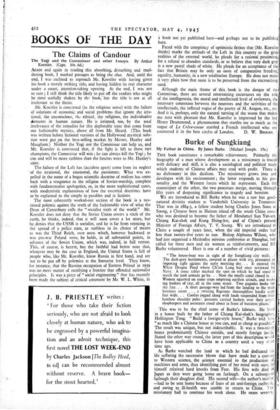BOOKS OF THE DAY
The Claims of Candour
The Yogi and the Commissar and other Essays. By Arthur Koestler. (Cape. 10s. 6c1.)
AGAIN and again in reading this absorbing, disturbing and mad- dening book, I marked passages as being the clue. And, until the end, I was- inclined to reproach Mr. Koestler with having given his book a merely striking title, and having hidden its real character under a smart, attention-taking opening. At the end, I was not so sure ; I still think the title likely to put off the readers who might be most usefully shaken by the book,' but the title is not at all irrelevant to the thesis.
Mr. Koestler is concerned (in the religious sense) with the failure of solutions of economic and social problems that ignore the irra- tional, the unconscious, it.: ethical, the religious, the individualist dements in human nature. He is irritated, too, by the total irrelevance of the remedies for this deplorable state that come from our fashionable mystics, above all from Mr. Heard. (This book was written before fictional versions of the Hollywood mystical solu- tion were put on the best-selling market, by Messrs. Huxley and Maugham.) Neither the Yogi nor the Commissar can help us, and Mr. Koestler is convinced that, if the fight is left to these two champions, the Commissar will win ; he can always kill the Yogi - he Can and will be more ruthless than the fascists were to Mr. Huxley's saint.
The failure of the Left has (accident apart) come from- its neglect ' of the irrational, the emotional, the passionate. What was -ex- pelled in the name of a bogus scientific doctrine of realism has come back with a vengeance in the religion of Soviet-worship, complete with fundamentalist apologetics, or, in the more sophisticated cases, with modernistic explanations of how the essential doctrines have to be explained to the simple in parables and in fictions.
The most coherently worked-out section of the book is a sus- tained polemic against the truth of the fashionable view of what the Dean of Canterbury calls the " socialist sixth- of the world." Mr. Koestler does not deny that the Soviet Union covers a sixth of the earth, he thinks, indeed, that it will soon cover a lot more, but he denies that the USSR is socialist, and he is far from rejoicing in tla. spread of a police state, as ruthless in its choice of means as was the Third Reich, over areas which, however backward as was pre-war Poland were, he holds, in all substantial points, in advance of the Soviet Union, which was, indeed, in full retreat. This, of course, is heresy, but the faithful had better note that, whatever may be the case in England, the United States is full of people who, like Mr. Koestler, know Russia at first hand, and are not to be put off by polemics at the Intourist level. They know, for instance, that the Russian occupation of Eastern Poland in 1939 was no mere matter of rectifying a frontier that offended nationalist principles. It was a piece of "social engineering" that has recently ' been made the subject of critical comment by Mr. W. L. "White, in
a book not yet published here—and perhaps not to be publishert here.
Faced with the conspiracy of optimistic-fiction that (Mr. Koestlet thinks) marks the attitude of the Left in this country to the grim realities of the external world, he pleads for a rational pessimist for a refusal to abandon standards, or to believe that very dark grey is a new pastel shade of white. He pleads for an acceptance of the fact that Britain may be only an oasis of comparative freedom; equality, humanity, in a new totalitarian Europe. He does not make it very plain how that oasis is to be preserved from the encroaching sand.
Although the main theme of this book is the danger of the Commissar, there are several entertaining excursuses on the MO of the intelligentsia, the moral and intellectual level of reviewers, the necessary connexion between the neuroses and the activities-of the intellectuals, the inflated vogue of the poetry of M. Aragon, etc., etc. And it is, perhaps, only the natural turning of the worm that Makes me note with pleasure that Mr. Koestler is impressed by the la% Henry Drummond, a phenomenon that startles me as much as the vogue of Le Creve-coeur startled a French intellectual who enj countered it in the best circles of London. D. W. BROGAN.


























 Previous page
Previous page